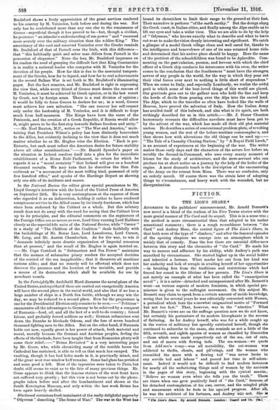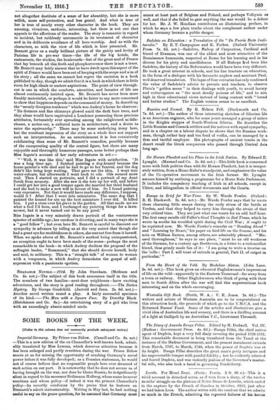FICTION.
THE LION'S SHARE.*
ACCORDING to the publishers' announcement, Mr. Arnold Bennett's new novel is a blend of the realism of his Five Towns stories with the more genial manner of The Card and its sequel. This is in a sense true; the method is more circumstantial than that adopted in his earlier sensational romances ; there is a rough resemblance between "the Card" and Audrey Hose, the central figure of The Lion's Share, in that both were of the type of "climbers," and after the funereal episodes of the opening chapters we emerge into an atmosphere which is mainly that of comedy. None the less there are essential differences between this story and the chronicles of "the Card." He made his way to success and affluence by his ability, while Audrey's path was smoothed by circumstance. She started higher up in tho social ladder and inherited a fortune. What marks her out from her kind was her audacity and lack of scruple in availing herself of her opportunities —in breaking free from the traditions and restrictions which had fenced her round in the lifetime of her parents. The Lion's Share is not merely an example of what has been called the "emancipation novel " ; it is a satire—detached and unimpassioned after Mr. Bennett's wont—on various aspects of modern feminism, in whioh special pro- minence is given to the suffragist movement. On this subject Mr. Bennett may claim to speak from a certain amount of inside knowledge, seeing that for several years he was editorially connected with Woman, a periodical which bore the somewhat enigmatical motto of "Forward but not too fast." That, however, was in the "nineties." What Mr. Bennett's views are on the suffrage question now we do not blow, but certainly his portraiture of its modern hierophants is the reverse of flattering. As for Audrey herself, who was for a while caught up in the vortex of militancy but speedily extricated herself, though she continued to subscribe to the cause, she reminds us not a little of the fifth, seventh, and eighth species of women as classified by Simonidos —those whieh were made respectively out of the sea, out of cats, and out of mares with flowing tails. The sea-woman—we quote from Addaion's essay—was all mutability, the cat-woman was addicted to thefts, cheats, and pirerings, and the woman who resembled the mare with a flowing tail "was never broke to any servile toil and labour" and passed her timo in self-adorn- ment. Indeed it would not be difficult- to find modern instancee for nearly all the unflattering things said of women by the ancients in the pages of this story, beginning with the cynical maxim: "Believe no woman even when she tells you the truth." There are times_ when one grew positively fond of "the Card," because of his detached contemplation of his own._career, and the mingled ptifie and amusement which he feels in his urneard progress. After all, he was the architect of his fortunes, and Audrey iva.e. not. She is • The Lion's Share. By Arnold Bennett.. London Cassell and Oa feir,1 - not altogether destitute of a sense of her absurdity, but she is more selfish, more self-protective, and less genial. And what is true of her is true of nearly every other character in the book. They are amusing, vivacious, sardonic, interesting, but there is not one that appeals to the affections of the reader. The story is romantic in regard to incident, but ruthlessly unromantic in its treatment of character and in its deliberate avoidance of all hero-worship. And as with the characters, so with the view of life which is here presented. Mr. Bennett gives us a really brilliant picture of the gaiety and levity of Parisian -life in Fe-war times—the life of the big hotels, the restaurants, the studios, the boulevards—but of the great soul of France that lay beneath all this froth and phosphorescence there is not a trace. Mr. Bennett may fairly answer that to have dwelt upon this aspect of the spirit of France would have been out of keeping withtheaeope and aim of his story ; all the same we !Anna- but regret the omission in a book published to-day, though We admit that it is a book inwhich there is little room for high ideals or austere aspirations. The point of view through- out is one in which the comforts, amenities, and luxuries of life are almost continuously insisted upon. Mr. Bennett has never been more frankly materialist, or perhaps it -would be fairer to say more concerned to show that happiness depends on the command of money. In describ:ng the "seemly Georgian residence" which was Audrey's home he observes: "Its dormers and fine chimneys glowed amid the dark bare trees, and they alone would have captivated a Londoner possessing those precious attributes, fortunately ever spreading among the enlightened m'ddle- classes, a motor-car, a cultured taste in architecture, and a desire to enter the squirearchy." There may be some underlying irony here, but the resultant impression of the story as a whole does not support such an interpretation. As an entertainment it is less consistently exhilarating than some of Mr. Bennett's comedies, possibly because of the exasperating quality of the central figure, but there are many enjoyable and thoroughly humorous passages, none better perhaps than Miss Ingate's account of her early adventures in art :— " Well, it was like this,' said Miss Ingate with satisfaction. 'It was a long time ago. I finished painting a dog-kennel because the house-painter's wife died and he had to go to her funeral, and the dog didn't like being kept waiting. That gave me the idea. I went into water-colours, but afterwards I went back to oils. -Oils seemed more real. Then I started on portraits, and I did a portrait of my Aunt Sarah from memory. After she saw it she tore up her will, and before I could get her into a good temper again she married her third husband and she had to make a new will in favour of him. So I found painting very expensive. Not that it would have made any difference' I suppose, would it ? After that I went into miniatures. The same dog that I painted the kennel for ate up the best miniature I ever did. It killed him. I put a cross over his grave in the garden. All that made me see what a fool I'd been, and I exchanged my painting things for a lawn- mower, but it never turned out to be any good.''
Miss Ingate is a very minutely drawn portrait of the venturesome spinster of middle age ; her candour is diverting, and in many ways she is a "good fellow " ; but even hero Mr. Bennett is careful to discount our sympathy in advance by telling us at the very outset that though she had a groat eye for snobbishness in others, she was not free from it herself. When we spoke above of Mr. Bennett's method being unimpassioned, an exception ought to have been made of the scene—perhaps the most remarkable in the book—in which Audrey declines the proposal of the suffragist leader, "Rosamund," that she should devote herself, body and soul, to militancy. This is a "straight talk" of woman to woman with a vengeance, in which Audrey formulates the gospel of self- express:on with a passionate egotism.



































 Previous page
Previous page